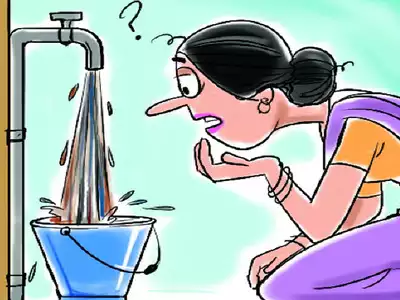Do you have any ideas on how to use less water? Water is a valuable resource. Until we find ourselves amid a water crisis, many of us take it for granted. Over the world, water waste is becoming a much bigger issue. Learning how to reduce water wastage at home is one method to contribute to the solution of this problem. This blog article will explore some typical water waste practices and offer advice on how to stop wasting water.
Wasting water
Everyone is aware that we should conserve water, but not everyone is aware of why. It does matter if you leave the water running while you brush your teeth or wash your hair because every drop counts. Let’s first examine the significance of being conscious of your water usage.
Water covers the vast majority of the planet. More specifically, water covers 71% of the surface of the globe. However, more than 96% of it is saltwater. As a result, fewer than 1% of the water on the surface of the world is potable.
Many individuals believe that because they reside in underdeveloped nations and have easy access to an abundance of water, they are unaffected by water waste. Every drop of water that exits your washbasin or shower must first go through a labor-intensive extraction, transportation, and purifying process. Your carbon footprint is impacted by water waste because it uses fossil fuels to go through this process.

How can you conserve water?
The average American family uses more than 300 gallons of water every day, with 70% of that usage occurring inside, according to epa.gov. That’s about 1135 litres, then!
One of a person’s essential needs is water. But the majority of people misuse it, wasting a lot of water and increasing their water bill.
Let’s examine how to monitor your water usage at home and reduce water waste.
Shut off the faucets: First and foremost, close your faucets while working. Are you, for instance, brushing your teeth? While you brush them, please turn it off!
You can conserve up to 6 liters of water each minute if you remember to switch off the faucets in the house! Sadly, a lot of faucets leak excessive amounts of water each year. Every year, roughly 10,000 gallons of water are lost due to leaky pipes and faucets. Checking your tap now will find several leaks that are simple to correct.
- Shorten your showers:
Second, how much water you waste is greatly influenced by how often you take showers. Water is wasted a lot during long showers. When taking a shower, the average person can use up to 17 liters of water each minute. What you can do is pay attention to how long you spend in the shower. You can achieve this by purchasing a low-flow showerhead and shutting the water off while using the shower to accomplish things like washing your hair, shaving, and scrubbing.
- Reduce how often you wash your clothes:
Your washing habits are the next item on our list of suggestions for reducing water waste. The global water cycle is impacted by domestic water waste. Two half-loads of filthy clothes require more water and energy than one full load. Reduce the number of times you wash your filthy clothes to save water and electricity. It can be wise to confirm that your washing machine is operating properly. Try to use a setting that uses less water while you wash. Control should be used to ensure that the water pipes are operating properly.
- Cut down on food waste:
The food you consume at home is produced using a lot of water. In addition to the 1.3 billion tonnes of food wasted annually, the World Resources Institute estimates that 45 trillion gallons of water are also wasted.
Plan your meals, make an inventory of the food in your refrigerator or cabinet, and adjust your meal plan as necessary. Water is wasted when food is wasted. Additionally, it entails increasing your savings!
- Seasonal eating:
We always exhort people to make local purchases. To extend that, consume just what is in season. You may save money, energy, and water by buying seasonal, locally-produced food.
Food from outside the area needs to be harvested, packaged, and transported. You can cut out the middleman when you purchase farm-to-table products. You can also consume less meat and dairy as their production requires a significant amount of water. Not to mention that food is more flavorful when it is in season!
- Use rainwater:
Do catch some rainwater if you want to do something simple to learn how to reduce your water waste. Up to 5.000 liters of water can be saved annually by installing water butts.
If you have plants in your home, rainfall is preferable to conventional tap water for their growth. You may certainly collect your rainwater, but you can also let your plants outside in the rain. So when it rains, throw that bucket outdoors!
- Be aware of how often you flush:
A third of all household water waste is caused by flushing the toilet. There are numerous things you may do to lessen yours, nevertheless! Make sure there are no leaks in your toilet. When it comes time to purchase a new toilet, choose one with a dual-flow or low-flush option. Today’s toilets are widely available and much more water-efficient. Newer toilets are required by U.S. Federal law to consume no more than 1.6 gallons of water per flush. Over and above the norm, high-efficiency toilets save roughly 20% more than regular toilets. Cotton, tissues, sanitary pads, and other items should be disposed of in the trash bin rather than the toilet.
- Dishwashing:
Did you realize that using a dishwashing machine saves water? Some people might believe that washing dishes in the washbasin helps them conserve water. But when you use a dishwashing machine, you are more efficiently utilizing the planet’s water resources. even if you hand-wash your dishes while using a bucket!
Avoid washing the dishes before placing them in the dishwasher if you use one, and make sure the load is full before starting the appliance. Use a program that consumes less water if you want to save water.

We appreciate you reading:
We hope you’ve gained some knowledge about how to use less water. We already know that water waste is a significant issue for both the environment and our pocketbook. There are numerous methods we can decrease the quantity of water we use at home without making any substantial changes or sacrifices, even though we can’t tell you how to end water waste. Instead, we can all contribute to the preservation of this priceless resource by following a few straightforward suggestions and methods. So let’s get started and use less water to save money and resources! What advice do you have for lowering water consumption?






